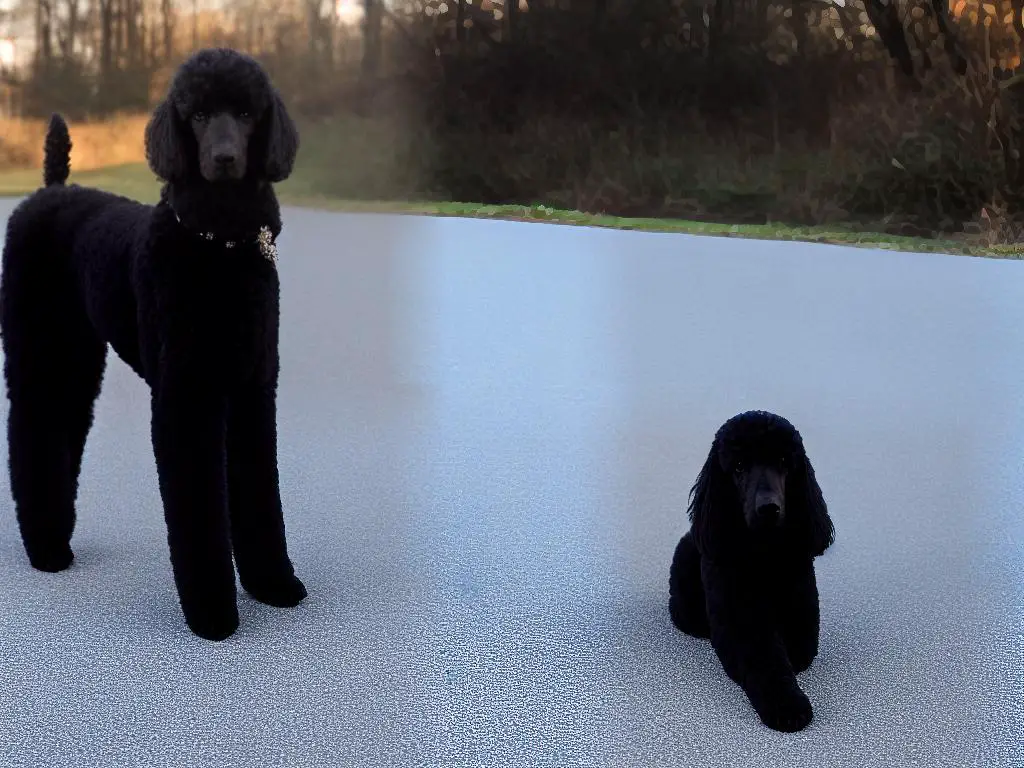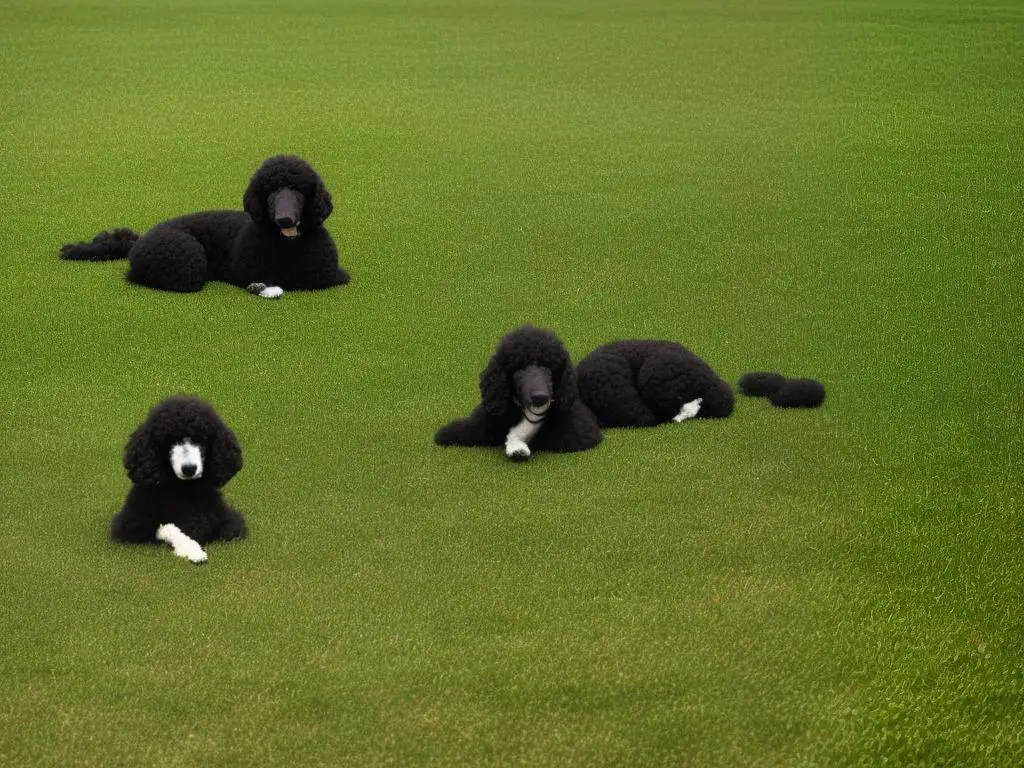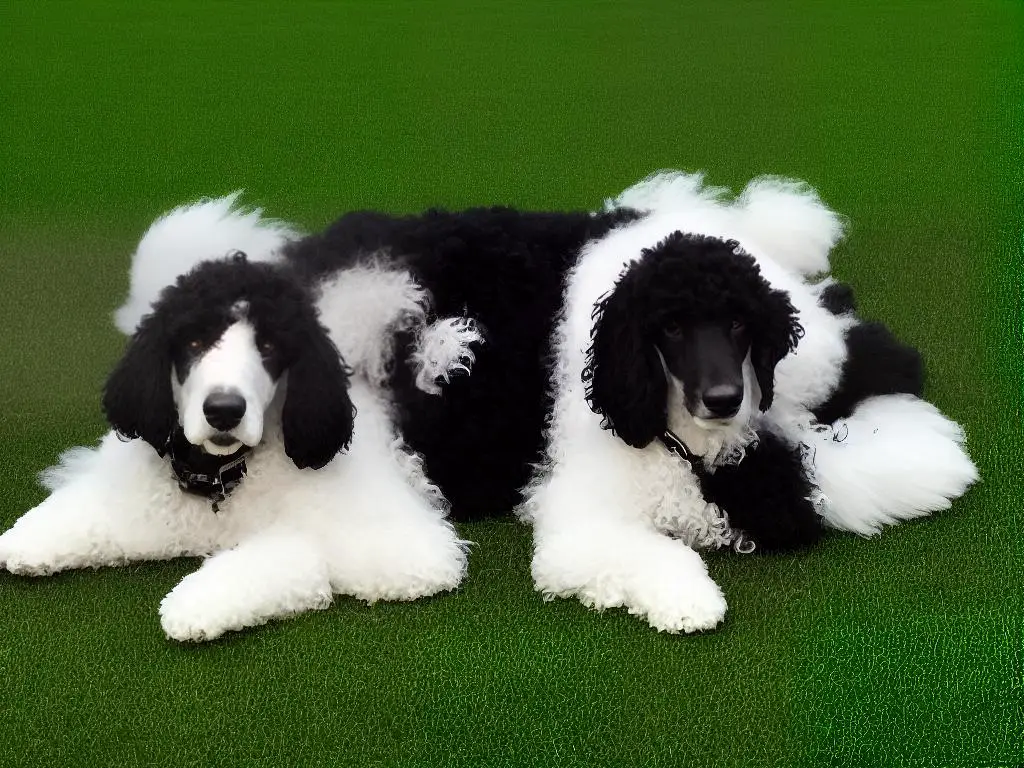Understanding Standard Poodle Temperament: A Comprehensive Guide
Imagine living with a companion whose stature is elegant, whose stride exudes grace, and whose intelligence matches that of the top canine elites – all these traits rolled into one breed – the standard poodle. While admired for their physical attributes, there’s a complex and often misunderstood aspect woven into the fabric of this breed – their temperament. This key characteristic, like a multi-layered painting, is influenced by various factors such as genetics, upbringing, environment, and training. In the following sections, we delve into these influences, shedding light on the genetic impact on standard poodle temperament, exploring how consistent training and a nurturing environment can mold this breed’s disposition and tackling ways to address potential behavioral issues.
The Genetic Influence on Standard Poodle Temperament
Standard Poodles
Standard Poodles are recognized for their superior intelligence, graceful elegance, and distinctive hairstyles. Still, what truly endears these dogs to their owners is their remarkable temperament. While it is true that environment and upbringing play a significant role in shaping a dog’s behavior, genetics also impact their temperament to a great extent. To better understand the Standard Poodle’s innate behaviors, it is beneficial to delve into the genetic influence on their temperament and how their lineage may dictate several of their traits.
Genetic Traits Common to Standard Poodles
Certain behavioral traits have been consistently observed in Standard Poodles throughout generations. These include intelligence, an eagerness to please, and a certain sensitivity. Poodles are often top performers in obedience and agility trials, demonstrating not only their intelligence but also their love of learning and enthusiasm to earn praise from their owners. Their sensitivity, meanwhile, shows in the form of empathy towards their human families’ emotions. These traits, appearing so frequently in Standard Poodles, suggest a genetic component in their manifestation.
High energy levels in Standard Poodles can also be attributed to genes. These active dogs are known for being lively and energetic, needing plenty of exercise and mental stimulation. Inherited from their lineage, which includes dogs used for fetching waterfowl and other hunting duties, this higher than average energy level and stamina are genetically built in a Standard Poodle’s DNA.
Genetic Behavioral Issues in Standard Poodles
While genetics often imbibe desirable traits, they can also be responsible for certain behavioral issues in Standard Poodles. The tendency towards separation anxiety and other nervous behaviors may well run in these dogs’ genetic lines. These intelligent dogs form deep bonds with their families and may become anxious and show destructive behavior when left alone for extended periods.
Neurotic behaviors can also be genetic in Standard Poodles. Obsessive-compulsive behaviors, such as tail-chasing or excessive barking, can sometimes be observed. Identifying a genetic basis for these behaviors can be helpful in managing and potentially reducing such tendencies.
The Impact of Breeding on Standard Poodle Temperament
Breeding plays a significant part in maintaining or altering certain behavioral traits in Standard Poodles. Reputable breeders put much thought into choosing parent dogs that not only look desirable but also exhibit sound temperaments. The chosen dogs are less likely to propagate unwanted behaviors in their offspring.
Certain traits primarily determined by genetics, like overall energy level and inherent intelligence, can be strengthened or downplayed via selective breeding. However, breeders need to tread carefully. Breeding two dogs with extreme traits can result in litters that are too extreme. For instance, breeding two highly energetic Standard Poodles may produce offspring with uncontrollable energy levels.
Understanding the Impact of Genetics and Environment on Standard Poodle Behavior
The individual temperament of a Standard Poodle is moulded by more than just genetics. Factors including the dog’s environment, upbringing, and training also substantially shape their behavior. However, understanding the genetic component associated with Standard Poodles can grant a richer understanding of their behavioral tendencies. This knowledge can be useful to predict certain traits in puppies and advise breeders in their choice of parent dogs, enhancing the breed for future generations. Studying this area serves as a stepping stone to understanding the nuanced science of canine behavior and its implications.

The Impact of Environment and Training on Standard Poodle Temperament
The Vibrant Personality of Standard Poodles
Renowned for their exceptional intelligence, agility, and responsiveness to training, Standard Poodles are wonderfully dynamic creatures. Their complex personalities often mirror their environment and the quality of training they receive. Given their profound sense of intuition, they are highly sensitive to their household atmosphere, which directly influences their behavior. A positive, consistent, and well-structured training environment brings the best out of them. As such, a well-managed environment and sensible training could greatly influence the temperament and overall behavior of your beloved Standard Poodle.
Socialization and Standard Poodle Temperament
Socialization is an important aspect of shaping the Standard Poodle’s temperament. The more varied, positive experiences they encounter as a puppy, the less likely they are to develop anxiety or fear-based reactions to unfamiliar situations in adulthood. Poodles need to be exposed regularly to different people, sights, sounds, and animals, which can help them develop into confident and well-rounded dogs.
Ensuring your poodle feels secure and happy in their environment is crucial. A stable, calm, and loving environment can prevent a Poodle from developing anxieties or stress-related behaviors. Conversely, a chaotic or unstable environment may lead to behavioral issues. Consequently, it’s crucial to create a tranquil environment that fosters the development of a balanced and calm temperament.
Influence of Training on the Standard Poodle’s Temperament
Training techniques can greatly affect a Standard Poodle’s temperament and behavior. Consistent, patient, and positive reinforcement training methods are most effective when training a Poodle as it promotes the development of a confident, comfortable, and well-behaved dog. Using harsh or punitive training methods can create fear and anxiety in your Poodle and can lead to unwanted aggressive behaviors.
Obedience training should begin at a young age for Poodles. With their high intelligence, they can quickly learn basic commands and tricks given the right motivation. Make sure that training is fun and reward-based, using positive reinforcement to encourage the desired behavior. This kind of positive experience will facilitate not only obedience but also a strong, trusting bond between you and your Poodle.
Quality of Care Shaping Poodle Temperament
The quality of care that your Poodle receives is also a significant factor in shaping their temperament. Like humans, dogs react to their treatment. Regular exercise, a balanced diet, plenty of mental stimulation, and lots of love and attention can promote the development of a happy, well-adjusted Poodle. Poor care can result in an unhappy, anxious dog.
Diet, in particular, can impact the temperament of your Poodle. Malnutrition or diet lacking in essential nutrients can lead to lethargy, irritability, and even aggressive behavior. Proper nutrition is a key aspect of care that can contribute to a balanced temperament in your pet.
Understanding the Temperament of a Standard Poodle
Training, quality of care, socialization, and environment all shape the temperament of a Standard Poodle. It is essential to create a positive, healthy, and stable environment to foster a calm, friendly, and confident poodle. Given their high intelligence and keen intuition, poodles require patient training coupled with careful and considerate handling. Providing the right care and nurturing will result in a Standard Poodle with an amiable and loving temperament.

Managing Behavioral Problems in Standard Poodles
About Standard Poodles
Standard Poodles, known for their elegance, intelligence, and gentle temperament, are cherished pets. However, like any dog breed, they present unique behavioural complexities that can potentially cause significant problems, such as anxiety or aggression, if not handled correctly. It is crucial to understand these issues and the most effective ways to mitigate them for the well-being of the poodles and their human family.
Understanding the Standard Poodle Temperament
Standard poodles are generally known for their good health and steady temperaments. They tend to be friendly, outgoing and make fantastic family pets due to their intelligent yet gentle nature. However, poodles possess a high intelligence level, compelling them to be frequently engaged both mentally and physically; else, they might exhibit behavioral abnormalities. They also hold a high level of sensitivity which can cause them to develop anxiety or fear-based reactions when subjected to stress or aggressive environments.
Recognizing Behavioral Problems
Some behavior problems in poodles might mirror those of other breeds, while some might be specific to poodles due to their unique nature. Common signs of stress or behavioral issues in standard poodles can include aggression, excessive barking, destructive behavior such as chewing or digging, separation anxiety, and unusual fearful responses. The earlier you recognize these signs, the quicker you can address the problem, reducing the risk of it becoming a long-term issue.
Managing Anxiety in Standard Poodles
Anxiety can materialize in various ways in standard poodles; excessive barking and destructive behavior while you’re away, extreme clinginess, or even changes in eating patterns. In many cases, anxiety can be managed by routine and predictability. Ensuring your poodle has a reliable daily schedule for meals, walks, playtimes, and rest can alleviate anxiety significantly. In more severe cases, anxiety-reducing aids such as comfortable dog vests, calming music, or even scent diffusers meant for dogs could prove helpful.
Managing Aggression
Aggression in standard poodles often roots from fear or protective instincts rather than innate hostility. Therefore, it’s necessary to identify and tackle the source of the fear. Proper socialization from a young age can help prevent fear-based aggressive behavior. Introducing your poodle to a variety of people, animals, environments, sights, and sounds can aid in developing positive associations and responses.
When to Seek Professional Help
It’s essential to understand that despite your best efforts, some behavioral problems may require the assistance of a professional. If your poodle’s behavior is causing harm to themselves, others, or if you’re unable to manage or modify the behavior on your own, seeking the help of a professional dog trainer or a veterinary behaviorist would be ideal. They can offer expertise in customizing a training and behavior modification plan specific to your poodle’s needs.
Conclusion
To summarize, addressing behavioral issues in Standard Poodles requires a blend of patience, empathy, consistency, and the readiness to seek professional guidance when needed. The ultimate goal should always be to nurture a joyful, well-balanced poodle that becomes a beloved member of your family. Your poodle’s welfare and joy significantly reflect on your household’s overall positive energy. Thus, promptly acting upon any behavioral challenges can greatly enhance the quality of life for all parties involved.

Real-Life Experiences: Standard Poodle Owners Share Their Insights
A Deep Dive into Understanding Standard Poodle Temperament Through Personal Observations
A common trait consistently reported by Standard poodle owners is the breed’s exceptional intelligence. Many owners narrate incidents of their poodles picking up commands or tricks after a handful of repetitions. Known to comprehend a wide range of intricate instructions, their eagerness to satisfy their owners enhances their training capacity. This ability to absorb quickly is widely recognized by owners, even those who have had their poodles for relatively short periods. However, as a flip side to their intelligence, they need consistent mental engagement. A lack of it can lead them to a state of ennui that may occasionally result in destructive behavior.
An Affectionate and Devoted Breed
Poodle owners consistently talk about the breed’s affectionate and loyal traits. They form strong bonds with everyone in their family but may exhibit a special attachment to one person. Owners often recount heartwarming moments of their poodles offering comfort during times of emotional distress, seemingly understanding the mood and providing silent companionship. However, their loyalty also means they can be protective, with some owners noting that their poodles are alert to strangers or possible threats in their environment, making them good watchdogs.
Playful Companions with a Dash of Stubbornness
The playful nature of standard poodles is something that stands out in owner anecdotes. Various accounts speak of the entertainment these dogs provide, whether it’s chasing a ball, playing fetch, or energetically exploring the environment during walks. Owners describe their poodles as being forever young at heart, with their playful spirit never waning even as they age. However, there’s a streak of stubbornness that can occasionally surface. This can be seen in scenarios where the poodle may not want to obey a command or would rather keep playing instead of settling down. This stubbornness is usually not problematic, though it does require firm and consistent training.
Social Butterflies with a Sensitive Side
Many standard poodle owners talk about the social nature of their dogs. These creatures, they mention, are often enthusiastic when meeting other dogs or people, happily engaging in play sessions at the park or on play dates. This is largely due to their curiosity and their general love for life. However, their social nature also means they crave companionship, and they can suffer if left alone for long periods. Some owners have mentioned instances of their poodles displaying signs of separation anxiety, which underscores the necessity of regular interaction and companionship for this breed.
To sum up, while the majority of standard poodle owners describe their dogs as intelligent, affectionate, playful, and social, they also note their individual quirks and sensitivities. Their intelligence requires mental stimulation, their loyalty can exhibit as protectiveness, their playfulness can become stubbornness, and their social nature can manifest as separation anxiety. Being aware of these can help prospective owners provide the right environment for their standard poodles to thrive. Understanding and respecting these traits help form a beautiful bond between the owner and their poodle, filled with mutual respect, deep affection, and, ultimately, enduring companionship.

Reflecting on the insights gathered from various standard poodle owners, it is evident that understanding the temperament of this distinct breed is both a science and an art, requiring a blend of knowledge about their genetic predispositions, an adaptable environment, and well-rounded training plans. It also involves the understanding and appropriate handling of their behavioral issues. Nevertheless, owning a standard poodle is a valuable and fulfilling experience, brimming with joys, challenges, and lessons. These fluffy companions aren’t just pets, but partners who continually keep us on our toes, pushing us to learn, adapt and become better caregivers. Together with the standard poodle, we share a life steeped in affection, mutual respect, and unending adventures.
